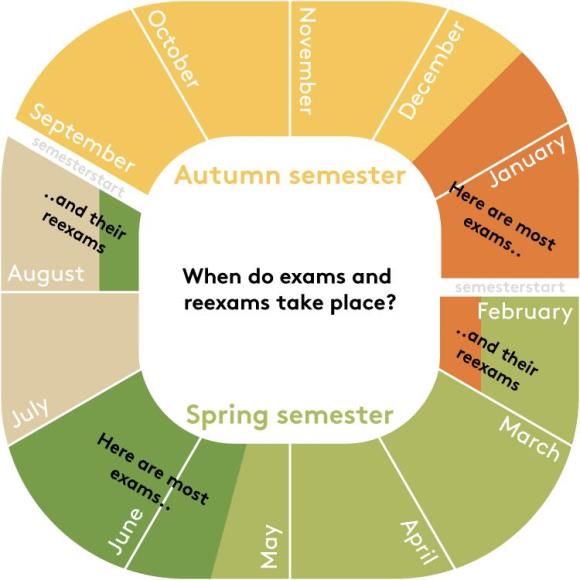An examination is a pedagogical exercise, where you show what you have learned. An examination can happen in many different ways, among others:
- Written assignments, handed in during the semester.
- Larger written assignments. In some cases you choose the topic and in other cases you are given an already defined topic. The larger written assignments can be individual or group assignments. Sometimes they are concluded with an oral defence.
- Oral examinations, where you sometimes draw a topic and talk to the examinator/sensor about it.
- Active participation in lectures. The lecturer assesses whether or not a student has participated actively in the lectures. An examination can for instance be passed solely through active participation. In other cases active participation is part of an examination as a supplement to a smaller examination at the end of the semester.
- And many other types of examinations...
It is a good idea to check out which types of examinations are part of your course in the beginning of the semester. That way you can prepare in the best possible way during the semester.
What is rewarded in examinations?
Each course has specific learning- and competence goals. The examination is about assessing to what degree you have achieved these goals.
Therefore, if you do not receive a good grading for in your examination, it is because you did not obtain the exact learning goals that was the purpose of the course. It may be that you have studied and prepared diligently, but if you have focused your efforts in the wrong direction it will not go well. E.g. it is not sufficient that you know everything about a topic, if the goal is that you should be able to put something into perspective and compare topics.
Check out what the goal for your examination is in the course description.
See your examination plan.

Grades for written assignments are made public no later than 4 weeks after the examination. Assessment of both Bachelor's projects and Master's thesis' must be made public no later than 6 weeks after submission (the month of July is not included in the calculation of neither the 4 or 6 weeks).
How do I find my examination results?
You will receive your results via. Self-service - where you can also make a print of all your results.
If you need help managing examinations, you can get help.
- General Study Counselling at SDU. Here you can talt to a Student Counsellor and participate in courses on examination techniques.
- Student Counselling Service provides psychological guidance for all students in Denmark.
Good webresources about managing examinations and examination anxiety:
- SDU's pages on managing examinations.
- Student Counsellings service's study tips, including examination anxiety.
|
Har du brug for hjælp til at håndtere eksamen? ➤ Kontakt Studie-og trivselsvejledningen. |